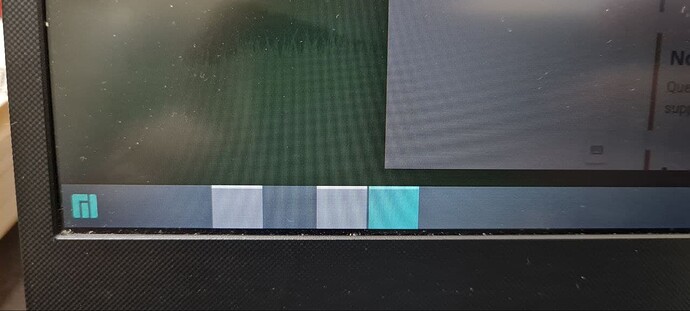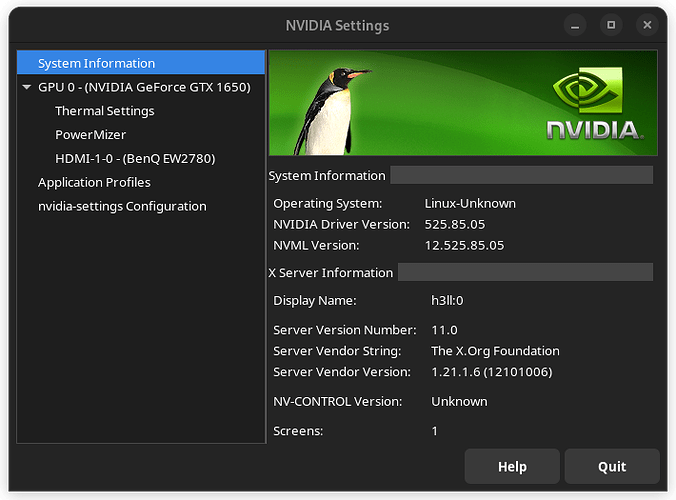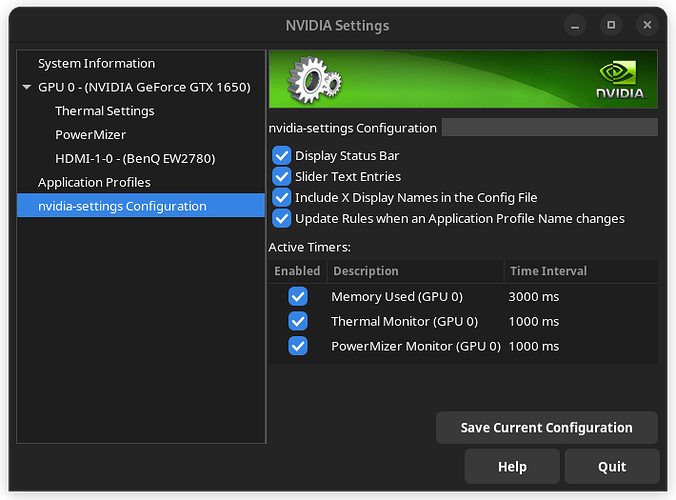I am using live usb and with properitery hardwares. when I gone on bottom pannel to click the firefox button, it disappered, but the button was actually there so on clicking firefox opened. Similarly happed with other icons in the panel and the application menu. The button exists and clickable, but icon is not visible
# dmesg | grep -i nvidia
[ 16.784023] input: HDA NVidia HDMI/DP,pcm=3 as /devices/pci0000:00/0000:00:01.0/0000:01:00.1/sound/card0/in
put15
[ 16.784082] input: HDA NVidia HDMI/DP,pcm=7 as /devices/pci0000:00/0000:00:01.0/0000:01:00.1/sound/card0/input16
[ 16.784140] input: HDA NVidia HDMI/DP,pcm=8 as /devices/pci0000:00/0000:00:01.0/0000:01:00.1/sound/card0/in
put17
[ 16.784204] input: HDA NVidia HDMI/DP,pcm=9 as /devices/pci0000:00/0000:00:01.0/0000:01:00.1/sound/card0/input18
[ 56.394030] nvidia: loading out-of-tree module taints kernel.
[ 56.394038] nvidia: module license 'NVIDIA' taints kernel.
[ 56.409420] nvidia: module verification failed: signature and/or required key missing - tainting kernel
[ 56.702995] nvidia-nvlink: Nvlink Core is being initialized, major device number 509
[ 56.703925] nvidia 0000:01:00.0: enabling device (0000 -> 0003)
[ 56.704091] nvidia 0000:01:00.0: vgaarb: changed VGA decodes: olddecodes=io+mem,decodes=none:owns=none
[ 56.747474] NVRM: loading NVIDIA UNIX x86_64 Kernel Module 525.85.05 Sat Jan 14 00:49:50 UTC 2023
[ 56.822518] nvidia-modeset: Loading NVIDIA Kernel Mode Setting Driver for UNIX platforms 525.85.05 Sat Ja
n 14 00:40:03 UTC 2023
[ 56.872978] [drm] [nvidia-drm] [GPU ID 0x00000100] Loading driver
[ 56.872996] [drm] Initialized nvidia-drm 0.0.0 20160202 for 0000:01:00.0 on minor 1
inxi -Fazzy ✔️ System:
Kernel: 6.1.7-1-MANJARO arch: x86_64 bits: 64 compiler: gcc v: 12.2.1
parameters: BOOT_IMAGE=/boot/vmlinuz-x86_64 lang=en_US keytable=us tz=UTC
misobasedir=manjaro misolabel=MANJARO_KDEM_2201 quiet
systemd.show_status=1 splash driver=nonfree nouveau.modeset=0
i915.modeset=1 radeon.modeset=1
Desktop: KDE Plasma v: 5.26.5 tk: Qt v: 5.15.8 wm: kwin_x11 vt: 1 dm: SDDM
Distro: Manjaro Linux base: Arch Linux
Machine:
Type: Laptop System: ASUSTeK product: TUF Gaming FX505GT_FX505GT v: 1.0
serial: <superuser required>
Mobo: ASUSTeK model: FX505GT v: 1.0 serial: <superuser required>
UEFI: American Megatrends v: FX505GT.311 date: 02/08/2021
Battery:
ID-1: BAT0 charge: 32.4 Wh (97.9%) condition: 33.1/48.1 Wh (68.9%)
volts: 12.3 min: 11.7 model: Simplo SDI ICR18650 type: Li-ion
serial: <filter> status: not charging cycles: 41
CPU:
Info: model: Intel Core i7-9750H bits: 64 type: MT MCP arch: Coffee Lake
gen: core 9 level: v3 note: check built: 2018 process: Intel 14nm family: 6
model-id: 0x9E (158) stepping: 0xA (10) microcode: 0xF0
Topology: cpus: 1x cores: 6 tpc: 2 threads: 12 smt: enabled cache:
L1: 384 KiB desc: d-6x32 KiB; i-6x32 KiB L2: 1.5 MiB desc: 6x256 KiB
L3: 12 MiB desc: 1x12 MiB
Speed (MHz): avg: 2450 high: 2600 min/max: 800/4500 scaling:
driver: intel_pstate governor: powersave cores: 1: 2600 2: 800 3: 2600
4: 2600 5: 2600 6: 2600 7: 2600 8: 2600 9: 2600 10: 2600 11: 2600 12: 2600
bogomips: 62431
Flags: avx avx2 ht lm nx pae sse sse2 sse3 sse4_1 sse4_2 ssse3 vmx
Vulnerabilities:
Type: itlb_multihit status: KVM: VMX disabled
Type: l1tf mitigation: PTE Inversion; VMX: conditional cache flushes, SMT
vulnerable
Type: mds mitigation: Clear CPU buffers; SMT vulnerable
Type: meltdown mitigation: PTI
Type: mmio_stale_data mitigation: Clear CPU buffers; SMT vulnerable
Type: retbleed mitigation: IBRS
Type: spec_store_bypass mitigation: Speculative Store Bypass disabled via
prctl
Type: spectre_v1 mitigation: usercopy/swapgs barriers and __user pointer
sanitization
Type: spectre_v2 mitigation: IBRS, IBPB: conditional, RSB filling,
PBRSB-eIBRS: Not affected
Type: srbds mitigation: Microcode
Type: tsx_async_abort status: Not affected
Graphics:
Device-1: Intel CoffeeLake-H GT2 [UHD Graphics 630] vendor: ASUSTeK
driver: i915 v: kernel arch: Gen-9.5 process: Intel 14nm built: 2016-20
ports: active: eDP-1 empty: none bus-ID: 00:02.0 chip-ID: 8086:3e9b
class-ID: 0300
Device-2: NVIDIA TU117M [GeForce GTX 1650 Mobile / Max-Q] vendor: ASUSTeK
driver: nvidia v: 525.85.05 alternate: nouveau,nvidia_drm non-free: 525.xx+
status: current (as of 2022-12) arch: Turing code: TUxxx
process: TSMC 12nm FF built: 2018-22 pcie: gen: 1 speed: 2.5 GT/s lanes: 16
link-max: gen: 3 speed: 8 GT/s bus-ID: 01:00.0 chip-ID: 10de:1f91
class-ID: 0300
Device-3: IMC Networks USB2.0 HD UVC WebCam type: USB driver: uvcvideo
bus-ID: 1-11:2 chip-ID: 13d3:56a2 class-ID: 0e02 serial: <filter>
Display: x11 server: X.Org v: 21.1.6 compositor: kwin_x11 driver: X:
loaded: modesetting,nvidia alternate: fbdev,nouveau,nv,vesa dri: iris
gpu: i915 display-ID: :0 screens: 1
Screen-1: 0 s-res: 3840x1080 s-dpi: 96 s-size: 1013x285mm (39.88x11.22")
s-diag: 1052mm (41.43")
Monitor-1: HDMI-1-0 pos: right res: 1920x1080 hz: 60 dpi: 82
size: 598x336mm (23.54x13.23") diag: 686mm (27.01") modes: N/A
Monitor-2: eDP-1 pos: primary,left res: 1920x1080 hz: 120 dpi: 142
size: 344x194mm (13.54x7.64") diag: 395mm (15.55") modes: N/A
API: OpenGL v: 4.6 Mesa 22.3.3 renderer: Mesa Intel UHD Graphics 630 (CFL
GT2) direct render: Yes
Audio:
Device-1: Intel Cannon Lake PCH cAVS vendor: ASUSTeK
driver: sof-audio-pci-intel-cnl
alternate: snd_hda_intel,snd_soc_skl,snd_sof_pci_intel_cnl bus-ID: 00:1f.3
chip-ID: 8086:a348 class-ID: 0403
Device-2: NVIDIA vendor: ASUSTeK driver:
snd_hda_intel v: kernel pcie:
gen: 1 speed: 2.5 GT/s lanes: 16 link-max: gen: 3 speed: 8 GT/s
bus-ID: 01:00.1 chip-ID: 10de:10fa class-ID: 0403
Sound API: ALSA v: k6.1.7-1-MANJARO running: yes
Sound Server-1: JACK v: 1.9.21 running: no
Sound Server-2: PulseAudio v: 16.1 running: yes
Sound Server-3: PipeWire v: 0.3.64 running: no
Network:
Device-1: Intel Cannon Lake PCH CNVi WiFi driver: iwlwifi v: kernel
bus-ID: 00:14.3 chip-ID: 8086:a370 class-ID: 0280
IF: wlo1 state: down mac: <filter>
Device-2: Realtek RTL8111/8168/8411 PCI Express Gigabit Ethernet
vendor: ASUSTeK driver: r8169 v: kernel pcie: gen: 1 speed: 2.5 GT/s lanes: 1
port: 3000 bus-ID: 03:00.0 chip-ID: 10ec:8168 class-ID: 0200
IF: enp3s0 state: up speed: 1000 Mbps duplex: full mac: <filter>
Bluetooth:
Device-1: Intel Bluetooth 9460/9560 Jefferson Peak (JfP) type: USB
driver: btusb v: 0.8 bus-ID: 1-14:3 chip-ID: 8087:0aaa class-ID: e001
Report: rfkill ID: hci0 rfk-id: 0 state: up address: see --recommends
Drives:
Local Storage: total: 1.4 TiB used: 0 KiB (0.0%)
SMART Message: Unable to run smartctl. Root privileges required.
ID-1: /dev/nvme0n1 maj-min: 259:0 vendor: Micron model: 2200V MTFDHBA512TCK
size: 476.94 GiB block-size: physical: 512 B logical: 512 B speed: 31.6 Gb/s
lanes: 4 type: SSD serial: <filter> rev: P1MA0V4 temp: 24.9 C scheme: GPT
ID-2: /dev/sda maj-min: 8:0 vendor: Western Digital model: WD10SPZX-11Z10T0
size: 931.51 GiB block-size: physical: 4096 B logical: 512 B speed: 6.0 Gb/s
type: HDD rpm: 5400 serial: <filter> rev: 1A01 scheme: GPT
ID-3: /dev/sdb maj-min: 8:16 type: USB vendor: HP model: x740w
size: 28.88 GiB block-size: physical: 512 B logical: 512 B type: N/A
serial: <filter> rev: PMAP scheme: MBR
SMART Message: Unknown USB bridge. Flash drive/Unsupported enclosure?
Partition:
Message: No partition data found.
Swap:
Alert: No swap data was found.
Sensors:
System Temperatures: cpu: 44.0 C pch: 44.0 C mobo: N/A
Fan Speeds (RPM): cpu: 2400
Info:
Processes: 273 Uptime: 3m wakeups: 7802 Memory: 15.48 GiB
used: 3.4 GiB (22.0%) Init: systemd v: 252 default: graphical tool: systemctl
Compilers: gcc: 12.2.1 clang: 15.0.7 Packages: pm: pacman pkgs: 1103
libs: 308 tools: pamac Shell: Zsh v: 5.9 default: Bash v: 5.1.16
running-in: konsole inxi: 3.3.24


